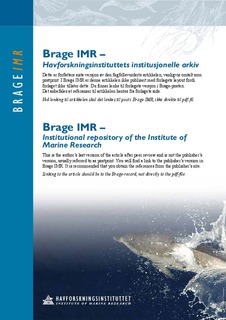The combined impact of plant-derived dietary ingredients and acute stress on the intestinal arachidonic acid cascade in Atlantic salmon (Salmo salar)
Oxley, Anthony; Jolly, Cecile; Eide, Torunn; Jordal, Ann-Elise O.; Svardal, Asbjørn Martin; Olsen, Rolf Erik
Journal article, Peer reviewed

View/
Date
2010-03Metadata
Show full item recordCollections
- Articles [3012]
Original version
http://dx.doi.org/10.1017/S0007114509992467Abstract
A study was conducted to assess the effect of substituting high levels of dietary fish oil (FO) and fishmeal (FM) for vegetable oil (VO) and plant protein (PP) on the intestinal arachidonic acid (AA) cascade in the carnivorous fish species Atlantic salmon. Four diets were fed to salmon over a period of 12 months, including a control FMFO diet, with varying replacements of plant-derived ingredients: 80 % PP and 35 % VO; 40 % PP and 70 % VO; 80 % PP and 70 %VO. Subsequently, fish were examined pre- (0 h) and post- (1 h) acute stress for blood parameters and intestinal bioactive lipidic mediators of inflammation (prostaglandins). Plasma cortisol responses were greatest in the FMFO group, while 80 % PP and 70 % VO fish exhibited increased plasma chloride concentrations. The n-3:n-6 PUFA ratio in intestinal glycerophospholipids from 70 % VO groups significantly decreased in both proximal and distal regions due to elevated levels of 18 : 2n-6 and the elongation/desaturation products 20 : 2n-6 and 20 : 3n-6. Increases in n-6 PUFA were not concomitant with increased AA, although the AA:EPA ratio did vary significantly. The 40 % PP and 70 % VO diet produced the highest intestinal AA:EPA ratio proximally, which coincided with a trend in elevated levels of PGF2α, PGE2 and 6-keto-PGF1α in response to stress. PGE2 predominated over PGF2α and 6-keto-PGF1α (stable metabolite of PGI2) with comparable concentrations in both intestinal regions. Cyclo-oxygenase-2 (COX-2) mRNA expression was an order of magnitude higher in distal intestine, compared with proximal, and was significantly up-regulated following stress. Furthermore, the 80 % PP and 70 % VO diet significantly amplified proximal COX-2 induction post-stress. Results demonstrate that high replacements with plant-derived dietary ingredients can enhance COX-2 induction and synthesis of pro-inflammatory eicosanoids in the intestine of salmon in response to acute physiological stress.
Description
Journal homepage: http://journals.cambridge.org/action/displayIssue?jid=BJN&tab=firstview © Cambridge University Press